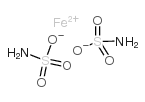14017-39-1
| Name | iron(2+),disulfamate |
|---|---|
| Synonyms |
EINECS 237-833-6
Sulfamic acid,iron salt Ferrous sulfamate |
| Molecular Formula | FeH4N2O6S2 |
|---|---|
| Molecular Weight | 248.01700 |
| Exact Mass | 247.88600 |
| PSA | 183.20000 |
| LogP | 0.37030 |
|
Section 1: Product Identification Chemical Name:Iron (II) sulfamate (38-42% aqueous solution) CAS Registry Number:14017-39-1 Formula:Fe(NH2SO3)2 EINECS Number:none Chemical Family:salt of an inorganic acid Synonym:Sulfamic acid, iron +2 salt
Section 2: Composition and Information on Ingredients IngredientCAS NumberPercentACGIH (TWA)OSHA (PEL) Title compound14017-39-140%1mg/m3 (as sol. Fe)no data water7732-18-560%no datano data Section 3: Hazards Identification Emergency Overview:Irritating to skin, and eyes. May be irritating to the respiratory tract. May be harmful if swallowed. Primary Routes of Exposure:Ingestion, eyes Eye Contact:Causes slight to mild irritation of the eyes. Skin Contact:Causes slight to mild irritation of the skin. Inhalation:May be irritating to the nose, mucous membranes and respiratory tract. Ingestion:No information available on the physiological effects of ingestion. Acute Health Affects:Irritating to skin and eyes. The toxicological properties of this compound have not been thoroughly investigated. Unrecognized hazards Chronic Health Affects: may be present. NTP:No IARC:No OSHA:No SECTION 4: First Aid Measures Immediately flush the eyes with copious amounts of water for at least 10-15 minutes. A victim may need Eye Exposure: assistance in keeping their eye lids open. Get immediate medical attention. Wash the affected area with water. Remove contaminated clothes if necessary. Seek medical assistance if Skin Exposure: irritation persists. Remove the victim to fresh air. Closely monitor the victim for signs of respiratory problems, such as difficulty Inhalation: in breathing, coughing, wheezing, or pain. In such cases seek immediate medical assistance. Seek medical attention immediately. Keep the victim calm. Give the victim water (only if conscious). Induce Ingestion: vomiting only if directed by medical personnel. SECTION 5: Fire Fighting Measures Flash Point:none Autoignition Temperature:none Explosion Limits:none Extinguishing Medium:none If this product is involved in a fire, fire fighters should be equipped with a NIOSH approved positive pressure Special Fire Fighting Procedures: self-contained breathing apparatus and full protective clothing. Hazardous Combustion andIf involved in a fire this material may emit irritating fumes. Decomposion Products: Unusual Fire or Explosion Hazards: No unusual fire or explosion hazards. SECTION 6: Accidental Release Measures Small spills can be mixed with vermiculite or other chemical adsorbent. The solid can be swept up and Spill and Leak Procedures: disposed of properly. SECTION 7: Handling and Storage Store in a tightly sealed container. Keep away from heat and direct sunlight. Material may degrade on Handling and Storage: prolonged exposure to air. SECTION 8: Exposure Controls and Personal Protection Eye Protection:Always wear approved safety glasses when handling a chemical substance in the laboratory. Skin Protection:Wear protective clothing and gloves. Ventilation:If possible, handle the material in an efficient fume hood. Respirator:No respirator required. Ventilation:If possible, handle the material in an efficient fume hood. Additional Protection:No additional protection required. SECTION 9: Physical and Chemical Properties Color and Form:green liquid Molecular Weight:248.02 Melting Point:no data Boiling Point:no data Vapor Pressure:no data Specific Gravity:no data Odor:none Solubility in Water:material is an aqueous solution SECTION 10: Stability and Reactivity Stability:air-sensitive liquid Hazardous Polymerization:none Conditions to Avoid:none Incompatibility:strong oxidizing agents Decomposition Products:carbon dioxide, carbon monoxide, organic fumes and iron oxide. SECTION 11: Toxicological Information RTECS Data:No information available from the RTECS files. Carcinogenic Effects:No data available Mutagenic Effects:No data available Tetratogenic Effects:No data available SECTION 12: Ecological Information Ecological Information:No information available SECTION 13: Disposal Considerations Disposal:Dispose of according to local, state and federal regulations. SECTION 14: Transportation Shipping Name (CFR):Non-hazardous Hazard Class (CFR):NA Additional Hazard Class (CFR):NA Packaging Group (CFR):NA UN ID Number (CFR):NA Shipping Name (IATA):Non-hazardous Hazard Class (IATA):NA Additional Hazard Class (IATA):NA Packaging Group (IATA):NA UN ID Number (IATA):NA SECTION 15: Regulatory Information TSCA:listed on the TSCA inventory SARA (Title 313):Not reportable under SARA Title (313) Second Ingredient:none SECTION 16 - ADDITIONAL INFORMATION N/A |
| Risk Phrases | R36/37/38 |
|---|---|
| Safety Phrases | 26-36/37/39 |
